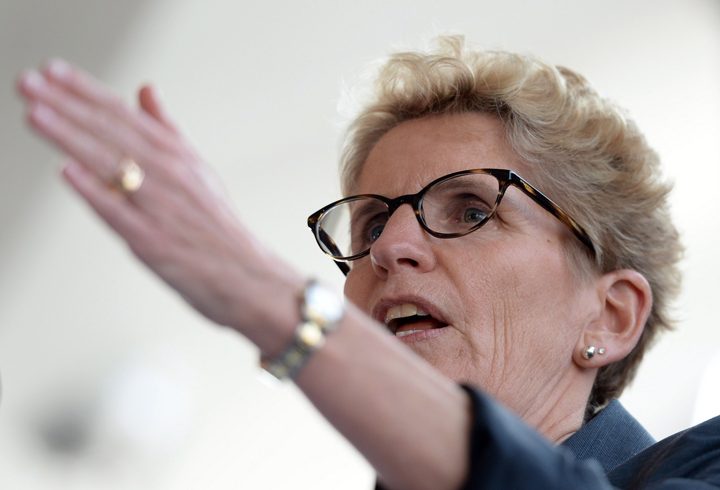TORONTO – Ontario Premier Kathleen Wynne is calling out Stephen Harper for refusing to meet with her for more than a year and is urging an end to the strained and distant nature of their dealings.

“That is too long a time between meetings of the prime minister and the premier of Canada’s largest province, whose relationship should be one of collaboration, not confrontation,” Wynne wrote in a letter she sent Thursday to Harper.
The Conservative prime minister and the Liberal premier last met Dec. 5, 2013, and since then both politicians have publicly taken jabs at each other over pension plans, the provincial deficit and infrastructure spending.
Most recently, Wynne added her voice to a growing number of groups concerned for sex workers’ safety by saying she has “grave concern” about the Harper government’s new prostitution law.
Wynne has asked the province’s attorney general to advise her on the legislation’s constitutional validity in light of the Supreme Court of Canada ruling quashing the old law, and for “options” in case its charter compatibility is questioned.
Harper was just outside Toronto on Thursday for a pre-budget roundtable discussion with the Retail Council of Canada in Mississauga, but no meeting with Wynne was scheduled.
Wynne said in the letter she hopes they can meet early in the new year.
Ontario NDP Leader Andrea Horwath said the relationship between the two politicians has been rocky for some time, but Wynne’s current approach is not getting the job done.
“You simply can’t poke a person in the eye and expect them to have tea with you the next day,” she said.
“It’s unfortunate because I think after a year it should be very, very obvious that strategy isn’t working in terms of the relationship. Perhaps it’s working for the premier politically.”
Interim Progressive Conservative Leader Jim Wilson said he thinks Harper “has his reasons,” but he hopes the two will meet soon.
“Hopefully they will get along and hopefully it will happen, but the premier has an unusual way of making friends by sending private letters, releasing those private letters, doing this through the media,” he said.
The premier noted in her letter that some of her ministers have reached out to their federal counterparts on issues she raised in previous letters to Harper, but it is “no substitute for leadership and collaboration at the top.”
The provincial ministers’ pleas to Ottawa are similar to Ontario’s oft-repeated requests. They want the federal government to match the province’s $1-billion commitment to build transportation infrastructure for the mineral-rich Ring of Fire.
They are asking for bigger equalization payments, for the federal government to boost infrastructure spending and for employment insurance reforms.
Ontario is also asking Ottawa for a meeting on pension plans – a major bone of contention between the two governments.
- What is a halal mortgage? How interest-free home financing works in Canada
- Ontario doctors offer solutions to help address shortage of family physicians
- Capital gains changes are ‘really fair,’ Freeland says, as doctors cry foul
- Budget 2024 failed to spark ‘political reboot’ for Liberals, polling suggests
Harper has panned Wynne’s bid to create a made-in-Ontario pension plan, saying people prefer tax breaks as a reward for saving for retirement, rather than having their taxes hiked to force them to save.
Wynne has complained that Harper’s antipathy towards pension reform is “offensive and inexplicable,” repeating it often during the spring election campaign that saw her win a majority government.
Harper has also recently said the Ontario government should focus less on “confrontation” and more on getting its fiscal house in order. Ontario has a $12.5-billion deficit the government has said will eliminate in 2017-18, while Ottawa is banking on a $1.6-billion surplus for 2015-16.
Ontario’s aboriginal affairs minister and the minister responsible for women’s issues also urged Harper to meet with Wynne over murdered and missing aboriginal women.
All the provinces and territories endorsed calls for a public inquiry, but the federal Conservatives have said they prefer to address the issue in other ways, such as through aboriginal justice programs and a national DNA missing person’s index.
Wynne told The Canadian Press earlier this year it was “outrageous” for Harper to say there’s no systemic aspect.



Comments